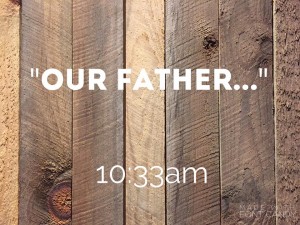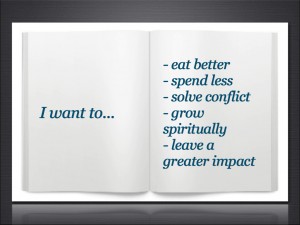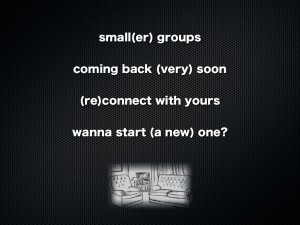by Jonathan Manafo | Jan 26, 2017 | Sunday Conversations
Can you think of two things in your life that just do not mix? Two things that if they met, would end in a crash and not look pretty? Perhaps an old high school friend that you don’t really want your family to meet. Might be awkward eh?
There some small things that we don’t care to mix up either aren’t there? Coffee and nachos might be one for me. When I think coffee, I think something sweet should accompany it. Would you agree?
We’ve ventured into a journey on prayer – The Lord’s Prayer. Prayer, if it is anything, it is about God’s space and our space colliding. It’s about God’s kingdom and our earth interweaving. When we pray we expect God to show up, to crash our party, to do his thing in our circumstance. There are no more powerful words that reflect this than the second phrase of Jesus’ prayer.
Your Kingdom come
your will be done
on earth
as it is in heaven
Those are some powerful words. If we ever thought prayer couldn’t accomplish much, these words tell us otherwise.
Let your kingdom come…
To understand Jesus, we have to understand kingdom. Jesus’ first used these words in Mark 1:15, “The time is fulfilled, the Kingdom of God is at hand” Jesus came to announce a kingdom – his arrival, his life, his death, his resurrection was the announcement of that kingdom, God’s kingdom.
He says in John 18:36, “My kingdom is not of this world.”
In other gospel texts we read about this kingdom being like…a person finding a rare and valuable pearl, like someone discovering treasure, like a mustard seed, starting small, but growing large, wide and strong.
At the end of the New Testament, Revelation says that Heaven will come to Earth – his kingdom will be fully here, realized.
So when Jesus says, “Your kingdom come”, he’s asking us to be part of his mission, his ways, his plan, to see a kingdom that rules and acts very differently than the kingdom of this world, to come and be present on earth.
Let your will be done…
Of course if we’re praying for God’s kingdom, then we’re praying for his will too.
God’s Will. You hear some Christians talk about this a lot right? People search for it, desire it, long for it, they hope they’re ‘in it’. Much mis-direction has happened under this umbrella.
I believe whole heartedly that there are certain things God wants me to do, certain choices God would want me to make, certain paths God wants me to take. That’s where discernment comes in. But in this prayer, we are not praying specifics as much as we are praying intention & purpose. Here Jesus is saying that we want God’s ways, God’s ideas, God’s love, God’s heart, God’s purpose…to be what guides and directs us. I guess the details will take care themselves.
When we pray “may your will be done” we’re essentially praying, “may my will be gone”.
This is a risky and crazy prayer of submission and commission. God, I want your ways in and my ways out – your love in, my hate out, your heart in, my selfishness out. When we pray this prayer, our view of people changes, our love for the world expands, our parenting changes, our friendships look different, everything is effected. Know this though – God doesn’t steamroll our wills in order to dictate his will in our lives and the world. He invites us to participate, and we invite him to come and do as he sees fit.
On earth… As it is in heaven…
Once you’ve prayed the first two parts of this phrase in the prayer, you realize very quickly that it affects you deeply, intimately, tangibly – in real and practical ways.
David Fitch says that, “Kingdom prayer demands location & presence.”
Heaven is where it begins (kingdom/will), but earth is where it’s realized.
Eugene Peterson says, “Prayer is worldly…it has to do with earthly matters…it’s the most worldly thing we do.”
This is where the practicalness of this prayer begins – the hereness, the nowness, that is involved in every prayer we pray. It’s the gutsy participation in every earthly detail.
Praying this prayer means that we see the world as beautiful as God intended it, while at the same time seeing it as broken as it truly is. May God’s ways, God’s grace, God’s beauty, be seen on and in the earth’s brokenness, it’s hurts, it’s depravity.
You can insert whatever you want in this phrase…
- at work as it is in heaven
- at home as it in heaven
- in my marriage as it is in heaven
- in my neighbourhood as it is in heaven
- in my situation as it is in heaven
- in my leaders as it is in heaven
This is so humbling, because as soon as you pray this for someone else, you realize how much you need it yourself. Shane Claiborn recently tweeted, “Tonight I pray for Donald Trump (insert any name you like) – that he might repent, follow Jesus, and live out the Sermon on the Mount. I pray the same for myself.” See, when we pray these words we are saying, ‘right here, right now, in me, in those around me, let your kingdom ways be real, be present, be tangible, be effective, etc.’
Where do you ‘do’ God’s will? On Earth. Everyday. With intention and purpose. In how you parent, in how you work, in how you love, in how you buy coffee, in how you serve others, in how you forgive, in how you do life. “Kingdom prayer doesn’t remove us from the world – but places us firmly in it.” (Fitch)
It’s a prayer for everyday and everywhere.
– – – – – – – – – – – – – – – –
Where in your life is Heaven and Earth connecting?
Are there thin places in your life where God is present, where God’s ways are evident, where God’s kingdom has shown up?
“May your kingdom come…your will be done…on earth as it is in heaven…”
by Jonathan Manafo | Jan 19, 2017 | Sunday Conversations
Have you ever wanted to spend an hour with a mentor who you respected, looked up to and wished you were like in some way? Maybe you’re an artist, a musician, a writer or someone in trades, and you’ve been inspired by others in your field of interest. Whatever it is that you do, either for work or as a hobby, there are others in your field who are better than you, that’s right, better than you. Anybody who wants to get better at who they are or what they do will look for and appreciate those who can teach them a thing or two.
If you know parts of (or much of) the Jesus story you’ve noticed that he is constantly teaching, inspiring, and modelling his life for others to learn and be challenged in the ways of his kingdom. Most of the disciples would follow as close as possible to hear everything Jesus was saying and watch everything he was doing. On one occasion, the disciples turned to Jesus and specifically ask him to teach them something. There was obviously something that was so pressing for them they asked Jesus to teach them a specific or particular thing. Their question, “Teach us how to Pray…”
Pray? You have one pressing question and it’s about prayer? Why not ask how to turn water into wine? There’s some money to be made there. Or how about to turn the switch off on a stormy day? That would be helpful. Instead they ask him to teach them how to pray.
Prayer is one of the those foundational things that you may not see happening, but it holds up the house. Like any foundation in a home, if it’s in place, and done well, it’ll hold up a whole lot of weight.
What was Jesus’ response to the disciple’s question? The Lord’s Prayer. You may have heard it, read it, spoken it, or simply heard of it. It’s a small part of the biblical text found two times in the NT: a full version in Matthew and a shorter version in Luke. It’s brief, simple, to the point, while being profound, powerful, life changing, and spiritually forming. This prayer is a model prayer; one to follow, emulate, in a broad sense or even an exact form. No pressure either way, though you might be hard pressed to find a better prayer to copy word for word!
For the next few weeks we will dive into this prayer. We will walk through it phrase by phrase. All 52 words (depending the translation you use) of it will hopefully have the impact on us that Jesus intended it to have.
Matthew 6
“This, then, is how you should pray:
“‘Our Father in heaven,
hallowed be your name,
10 your kingdom come,
your will be done,
on earth as it is in heaven.
11 Give us today our daily bread.
12 And forgive us our debts,
as we also have forgiven our debtors.
13 And lead us not into temptation,
but deliver us from the evil one.’
It’s important to see how Jesus starts this prayer. It’s like entering a house for the first time. It’s obviously more important that you actually enter the house than what entrance you choose, however, the best place to walk into any house for the first time is the front door. If our faith is a home and prayer is our way in, then Our Father is the front door.
 Jesus is the one who introduces us to the term Father. Israel were called God’s children, but they didn’t refer to God as Father, at least it’s not recorded that way in the OT. Jesus on the other hand makes this term common, normal, accepted, and welcomed. The word he uses is Abba, Father, (Mark 14) the most intimate of ways to use the word Father. Paul picks up on this and uses the term in places like Romans & Galatians.
Jesus is the one who introduces us to the term Father. Israel were called God’s children, but they didn’t refer to God as Father, at least it’s not recorded that way in the OT. Jesus on the other hand makes this term common, normal, accepted, and welcomed. The word he uses is Abba, Father, (Mark 14) the most intimate of ways to use the word Father. Paul picks up on this and uses the term in places like Romans & Galatians.
Romans 8:15
The Spirit you received does not make you slaves, so that you live in fear again; rather, the Spirit you received brought about your adoption to sonship. And by him we cry, “Abba, Father.”
Galatians 4:6
Because you are his sons, God sent the Spirit of his Son into our hearts, the Spirit who calls out, “Abba, Father.”
We can’t love God as an idea or a force or a dogma, we can only love him in a personal and intimate way, as Father. This is Jesus’ metaphor of choice. He uses the word 15x alone in the sermon on the mount (Matthew 5-7).
When we start with Father, we start with relationship.
When we start with Father, we start with love, goodness, kindness, etc.
When we start with Father, we start with community.
“The oldest and most implacable enemy in the practice of prayer is depersonalization – turning prayer into a technique, a device.” (E.Peterson)
Jesus says, when you pray, make it personal, start with Father, our Father. Notice he doesn’t say, My Father, as if God is just my or your father, he says ‘Our Father’. We don’t pray to God alone. We may feel alone at times, we may be alone at times, but no matter where you are or where you pray, when you communicate do God, you are part of a community that looks to him as Father.
I’m sure as many read this you might be thinking, ‘but you didn’t have a dad like mine, he wasn’t so great, in fact he was pretty bad.’ The reality is that some of have had horrible experiences with their father or parents; it is unfortunate and unfair, but it happens. For those with good parents, know that God is better, for those with bad or no parents, know that God can be the only Father or Parent who ever loved you the way he does. He is a Holy, powerful, wonderful, capable, strong, loving Father. That’s a great place to start when you begin the journey in discovering God through prayer.
The disciples could’ve asked Jesus to teach them anything. They chose prayer.
Jesus could’ve started anywhere. He started with ‘Our Father’
Will you make prayer personal, relational, real, and honest?
Will you go to God like a loving Father who cares, loves, guides, and helps?
Will you see God as Holy, Big, Strong, not you, but HIM?
by Jonathan Manafo | Jan 10, 2017 | Sunday Conversations
It’s fair to say that if there was one blanket statement that covered all your resolutions it would be, “I hope this is a good year?” Who wouldn’t want a ‘good’ year, especially if you’re comparing it to a ‘bad’ year.
The top five area’s of our life that get addressed (or should get addressed) are our Health, Finances, Relationships, Spirituality/Faith, Impact. We might say things like: I want to eat less, I want to spend less, I want to solve more relational conflicts, I want to grow spiritually, and I want to make a greater impact in the world. Why are these ones the biggies? Because they really do effect who we are and who we are becoming.
 You’ll notice pretty soon into each new year that people give up on their resolutions fairly quickly: the Gym sees you less, the diet isn’t as strict, the budget isn’t clean, the bible gets dusty, and it’s only January 9th. Maybe it’s because we don’t start with December in mind. I mean, if we started our planning thinking about how we want to feel or look in December, or how much money we want saved, or what kind of Jesus follower we want to be, we might make more wise decisions. Saying that, the best way to get to where we’re going is to start in the right spot, get on the right train, pick the proper route.
You’ll notice pretty soon into each new year that people give up on their resolutions fairly quickly: the Gym sees you less, the diet isn’t as strict, the budget isn’t clean, the bible gets dusty, and it’s only January 9th. Maybe it’s because we don’t start with December in mind. I mean, if we started our planning thinking about how we want to feel or look in December, or how much money we want saved, or what kind of Jesus follower we want to be, we might make more wise decisions. Saying that, the best way to get to where we’re going is to start in the right spot, get on the right train, pick the proper route.
This is why days like January 1st, September 1st and Birthdays can be so key. They give us a chance to reprioritize, reorganize, create new and healthier habits, declutter, etc.
Paul’s words from Philippians 3 are very helpful here. Paul is writing to friends, encouraging them, challenging them, and teaching them how to better followers of Jesus. It’s interesting that the words he uses are clever, wise, strategic and very thoughtful, especially when it comes to helping us figure out what direction our lives can and should be headed. As you read it, notice the words that pop up…
For God’s way of making us right with himself depends on faith. I want to know Christ and experience the mighty power that raised him from the dead. I want to suffer with him, sharing in his death, so that one way or another I will experience the resurrection from the dead!…I focus on this one thing: Forgetting the past and looking forward to what lies ahead, I press on to reach the end of the race and receive the heavenly prize for which God, through Christ Jesus, is calling us…But we must hold on to the progress we have already made. Dear brothers and sisters, pattern your lives after mine, and learn from those who follow our example.
Paul is clear and intentional. He chooses who we wants to know (Christ), and what knowing him will lead to (resurrection). He is focused, determined, pressing towards a goal. He knows how to balance letting go and holding on in a way that helps him move forward and become who God is calling him to be. Then he invites his friends to follow a pattern, his pattern, knowing that if they do, they to will experience something similar, Jesus and his resurrection life.
May we be people who move from intentions to plans to patterns. May we make thoughtful and strategic choices today, knowing they will lead us to where we want to be tomorrow (where God wants us to be). May we take advantage of certain seasons throughout the year (New Years, September, Birthdays, Lent, Advent, Spring, etc.) to take stock of where we’re at and if there’s any realignment necessary to get to where we’re headed. May we never think that we can do it alone, but with God and in community. And finally, may God’s spirit in us, the spirit of Jesus, effect the way we view and handle our health, our finances, our relationships, and of course our faith, so that we can be people who impact the world around us in meaningful and restorative ways.
AMEN!
– – – – – – – – – – – – – – – – – – – – – – – – – – – – –
We shared two other things on Sunday that we hope were helpful. One was a video (at the top of the talk) and the other were 5 reasons our resolutions often fail (at the end of the talk). The video can be found HERE. The 5 reason are below & in full HERE. (borrowed from Carey Nieuwhof)
- Your Resolutions Are Essentially Intentions
– strategy is key / make a plan
- Your Priorities Keep Being Hijacked
– only you can control this
- You Added, But Never Subtracted
– if everything is important, nothing is important
- You Didn’t Address Your Patterns
– patterns can help or hurt us, choose wisely
- You Left Your Calendar Out Of The Equation
– what fills up the squares on your calendar?
by Jonathan Manafo | Jan 10, 2017 | events

(contact us for more info about this essential class being offered)

(Let us know that you’re coming to the PARTY)

(this is going to be monumental for couples. don’t miss out)








